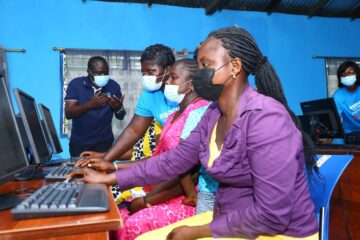According to the CDC data, COVID-19 is more dangerous for men than women. Worldwide statistics show that men infected with coronavirus die 2.4 times more frequently than women. But the International Monetary Fund, the United Nations, and finally, the WHO made a statement that the current pandemic impacts women much more than men. This situation is happening not only in the Global South.
Economic Impact & Unemployment
Companies and organizations working in the service and social sectors were impacted by the COVID-19 lockdown the very first. After a year of the outbreak, a lot of their employees lost jobs and financial stability. According to the IMF data, the overwhelming majority of the service sector’s employees were women. In some countries like Guinea, women occupy up to 85% of service sector jobs. Even in the US, the unemployment rate among women increased by 2% more than among men.
At the same time, most women, especially from the Global South, do not work officially, which means they couldn’t apply for new unemployment benefits or get legal support from their employers or governments. But even if they are legally employed, usually women gain less money than men; thus, they save less. The IMF reported that the number of women in poverty is rapidly increasing during the lockdown.
Moreover, during the current pandemic, women had to do more unpaid household service and take care of children and the elderly. However, even before the lockdown, women make three times more household work than men. As a result, the current global outbreak impacted even employed women as they can’t return to work if child care and schools closed. The Labour Force Survey performed in Canada in May 2020 shows that women’s employment increased by 1.1% after the lockdown. At the same time, men’s employment grew by 2.4%. Child care issues primarily cause this disproportion.
Safety Issues
After the first months of the global outbreak, the United Nations has rung a bell reporting domestic violence’s extreme growth worldwide. According to the UN data, up to 243 million women and girls are subjected to domestic violence annually. Considering that many cases stayed unreported, it’s scary to imagine the full numbers of domestic violence situations.
Unfortunately, financial instability and a strict lockdown in most countries worldwide caused an increase in these cases. Reports of domestic violence increased by 30-40%, even in developed countries such as France and Singapore. In Russia—where we do not have a domestic violence law—the number of cases grew 2.5 times!
Simultaneously, in developing countries like India, the number of marriages arranged by families increased by 30%. This is often only one way out of poverty for many families or the way to secure the future of girls during the current economic crisis. However, family arranged marriages for young girls often cause discrimination, lack of education, and domestic violence.
Health Impact
According to the UN data, around 2/3 of all healthcare workers are women. This statistic is valid for the whole world. Recent global research shows that 70% of all infected with COVID-19 healthcare workers were women, especially nurses, with the highest number of reported cases among all front-line workers (30-40% depends on the country). Moreover, female health workers more frequently (70% of all reported cases) have been subjected to stigmatization and society’s violence.
Simultaneously, female workers faced more issues with personal protective equipment (PPE) at the front line. And the reason is not only the lack of PPE. In late April 2020, the BBC reported that currently produced PPE does not fit many female health workers as it is making based on male sizes and somehow called “unisex.” In the current pandemic, the lack of suitable PPE can cause more virus infection among female healthcare workers. It may even jeopardize patient’s life and health as it reduces the effectiveness of health worker movements.
Summary
Unfortunately, not any country globally—even developed ones—added women support activities to their COVID-19 policies or post-pandemic economic recovery plans. At the same time, some countries implemented several projects. For instance, citizens of several EU countries such as Austria, France, Italy, and Portugal can legally extend paid leaves if they do not have any childcare alternatives because of closed kindergartens and schools. But still, this is not enough! That’s why the IMF is afraid that the global outbreak will roll back the development of women’s and girls’ rights gained in the past 30 years.
Thumbnail image by Edwin Hooper on Unsplash



